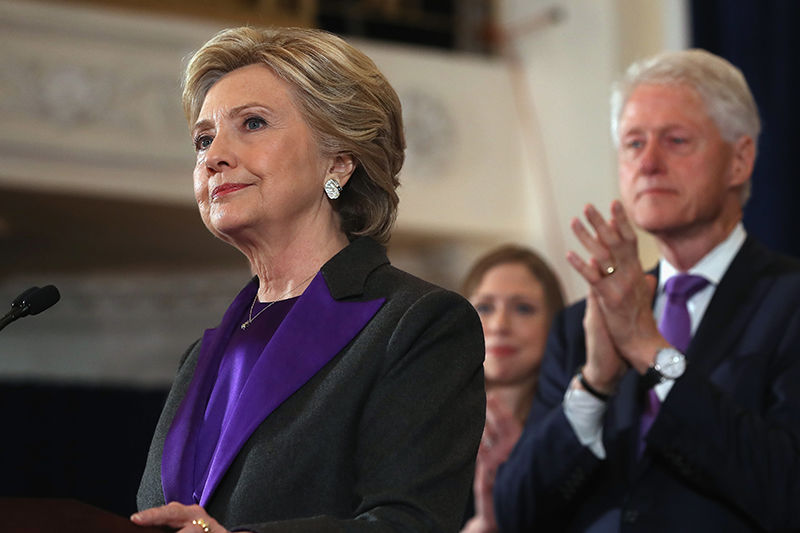The country woke up in turmoil on Wednesday after an election season that can only be characterized as crazy. The idiosyncratic Mr. Trump, a man who has never held elected office and whose policy positions are very recently arrived at, was handed a decisive victory, along with continued Republican control of the House and Senate.
While it may take years to sort out the many currents that brought us to this point, the exit polls clearly show both a strong desire for change, and very high levels of disapproval of both candidates, with the desire for change “trumping” the high levels of disapproval. In this respect, the election was also a referendum of sorts on the past eight years.
Although voters were definitely turned off by the scandals that have accumulated around Clinton, her arrogance and above-the-law attitude, a major turning point for many voters was her comment about Trump supporters being a “basket of deplorables.” This blanket demonization of a vast segment of the citizenry included a litany of phobias and isms: homophobia, xenophobia, Islamophobia, racism and sexism. In short, “these people” were hate-filled and bigoted.
With this pronouncement, Clinton became the leader in the radical liberal effort to stigmatize and disenfranchise from the public square countless citizens whose opinions differ from hers and the liberal elites. These liberal elites run our schools and universities and our professional associations. They dominate Hollywood, other drivers of popular culture, the mainstream media and, very nearly, the Supreme Court.
But Clinton’s campaign math did not add up. To win, the Clinton campaign actually needed the votes of more than her liberal base. She needed regular, mainstream Americans with traditional and time-honored views on marriage or religiously-informed opinions on the absolute sanctity of human life. With her comment, Mrs. Clinton made her own disdain for that large part of the electorate quite clear and it rankled.
Exit polls revealed another part of the election-results puzzle. About 21 percent of voters called Supreme Court appointments the most important factor in their vote — an unprecedented number. And 57 percent of these chose Trump over Clinton. Because of the prominence of the Supreme Court vacancy and the Republican Senate decision to keep the vacancy open in order to let the American people have a say in the selection through their votes in November, voters had the issue clearly presented to them in this election.
Voters understand that the Supreme Court is the final safeguard of our constitutional rights and personal freedom against a government that every day grows more powerful and controlling. Liberties that our citizens have enjoyed since the inception of our country, like that of exercising our faith freely in the public square, have been under growing and constant threat for the last eight years.
The next president will certainly nominate at least one, and probably more, justices to the bench, and a Clinton presidency would have ensured continued hostility from the courts for religious liberty, the protection of life and political speech. A Trump presidency makes possible a Supreme Court that will step in to protect, for instance, the Little Sisters of the Poor against the coercion of federal agencies, to secure the ability of society to protect the health and safety of women by regulating abortion facilities and defend the rights of all to participate in political speech without fear of the IRS or other government enforcers.
It is the most vulnerable members or our society — like the elderly indigent that the Little Sisters care for, and the women in danger from unsafe clinic practices — that will benefit.
Catholics across the country also preferred change over a third Obama term, with exit polls showing them voting for Trump by a 52 percent to 45 percent margin. Experts have noted the margin among church-attending Catholics was even higher. The extreme views of Clinton on life are way out of sync with mainstream American views, let alone church-attending Catholics. An example of this extremism is Clinton’s repeated, emphatic promise about ending the Hyde Amendment if she became president. This is the federal amendment that restricts taxpayer funding for elective abortions, respecting the rights of the millions that don’t wish to pay for a procedure they consider deeply immoral.
Voters have, in fact, voted for drastic change by electing Mr. Trump. The fundamental change needed is the inclusion in the national conversation of the thoughts and opinions of so many citizens who have been ignored and marginalized by those in charge for the past eight years. And secondly, but as importantly, is the restoration of our first freedoms: respect for religious liberty and the life of the most vulnerable members of our society.
Dr. Grazie Pozo Christie writes and speaks in both Spanish and English about Catholicism, family life and being a faithful Christian in the public square. She practices radiology in the Miami area, where she lives with her husband and five children.

